Best Online Community Colleges for Financial Aid Assistance

Find your degree
For this Top ranking, we have scored each two-year community college and comparable technical college, located in the United States that offers students a selection of distance-learning programs in an online format, whether synchronous or asynchronous, based on our ranking criteria. We’ve done this to try and determine which of these colleges might best suit students that are serious about obtaining a degree online without breaking the bank.
Each of these schools offers traditional face-to-face students and distance-learning students a myriad of different academic scholarships, athletic scholarships, social scholarships, discounts, and a variety of other types of financial aid in addition to offering a healthy selection of educational programs that can be completed online and usually in an asynchronous format.
Methodology
We have judged and ranked all of the two-year community colleges and comparable technical colleges that are located within the United States and that offer a selection of online academic programs for distance-learners to choose from whether they were synchronous or asynchronous. We have ranked each community college based on the following ranking criteria:
- 1/3: Student Financial Aid Rates;
- 1/3: Freshman Retention Rates and;
- 1/3: Graduation Rates
After scoring each school based on these ranking criteria, we then compared each of the schools against each other to determine their final placement in our Top ranking. To gather the information that we required for this list, we utilized each of the school’s websites whenever possible to obtain their overall Student Financial Aid Rates, their Freshman Retention Rates, and their total Graduation Rates. In any cases where we were unable to locate this information on a school’s website, we utilized the databases of following two expansive sites to obtain the required information:
The reason we chose the three different rates that we utilized as our ranking criteria is also relatively straightforward; the three criteria used were selected based on the following logical reasoning:
- Student Financial Aid Rate: The school’s overall Student Financial Aid Rate helps to showcase how easy it might be to obtain some degree of financial assistance in one form or another from a particular community college. The types of financial aid that are available through each community college (including academic, merit, external, and athletic scholarships, loans, discounts, and payment assistance options among others) and the types of cost (and in what amounts) that the various forms of financial aid assists with varies from school-to-school and the eligibility for funding varies from student-to-student. However, this rate still serves as a fairly useful and accurate indicator of how much overall financial assistance each student can expect to receive from a particular community college;
- Freshman Retention Rate: A school’s Freshman Retention Rate is a reliable indicator that the students who are enrolled in an academic program at a particular community college are overall content with the quality and the type of monetary assistance and educational instruction that they are receiving from a school’s faculty members;
- Graduation Rate: A school’s total Graduation Rate is a further indicator of how satisfied the attending students are with the quality of the education that they are receiving. The amount of students that decide to stick with a school for the entirety of their academic career can easily be viewed as a strong indicator that the community college in question is more than capable of providing their students with a comprehensive and quality education.
We feel that by looking sharply at these three ranking criteria, we will not only be able help to help serve students in their search to find a high-quality community college or technical school, but will also be able to help them to find one that will allow them to obtain their academic degree or professional/vocational certification online without the cost of education being such a heavy financial burden in their personal and professional lives. This is thanks to the various available financial aid programs and financial assistance services that each of these schools has available for their enrolled students to take advantage of.
Please also check out our ranking of the best online colleges.
Related:
- Financial Aid Packages: An Easy Guide for Students and Parents
- Finding and Applying for College Scholarships
- Pros and Cons of Online College
- Free & Most Affordable Colleges In America
- Free Laptops for College
1: Flint Hills Technical College
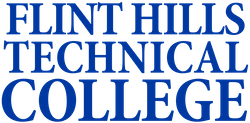
The campus is located in Emporia, Kansas. FHTC is how the school is usually referred to, and it is a public two-year technical college that serves 1020 students. 69% of those students are working towards their degree on a part-time basis, and only 22% of them are doing so taking some form of online course. There are 22 different degree programs offered at FHTC, and they’re accredited by the Higher Learning Commission. Also, both dental programs available are accredited by the American Dental Association and the Commission on Dental Accreditation.
Two-time Sprint Showdown winner and 2008 NASCAR Nationwide Series Champion stock car driver Clint Bowyer attended FHTC. He was born and raised in Emporia and is very involved in community projects there. He sponsors an Automotive Scholarship. FHTC hosts a diverse array of online education services. They are the host of an online high school that serves the community, and there are several general education classes that students can take at any time. FHTC offers hybrid or blended programs in Emergency Services Technology, Industrial Engineering Technology, which both require hands-on components to the instruction; and a program in Interactive Multimedia Design, which is available in the hybrid style, or entirely online. The rest of the programs available entirely online are in:
- Business Administrative Technology
- Power Plant Technology
- Healthcare Administration and Management
All 6 of these programs get students completely career ready.
FHTC Website
Student Financial Aid Rate: 89.0%
Freshman Retention Rate: 76%
Graduation Rate: 67%
2. Lincoln Trail College
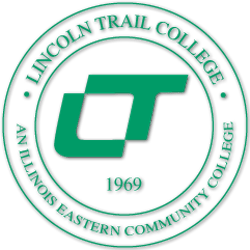
Lincoln Trail College is the second school on this list that is a member of the Illinois Eastern Community Colleges organization. It’s located in Robinson, Illinois and was founded in 1969. It received its original accreditation from the Higher Learning Commission that year and has upheld that accreditation ever since. The school is authorized to award students with certificates and two-year degrees. There are 25 different programs that students can enroll in. There are currently 934 students enrolled, 57% of them participate at a part-time frequency, and 76% of them are taking their classes solely in a traditional format. LTC and the other schools that are part of the Illinois Eastern Community Colleges organization serve an essential purpose in the very rural community they’re based in.
LTC’s mission is to “deliver exceptional education and services to improve the lives of our students and to strengthen our communities.” They do this through their open enrollment policy, meaning that 100% of all applicants are accepted and 100% of their student body is receiving financial aid. Because of the extensive financial assistance opportunities, the average net price is $1,251 per academic year. LTC allows students to obtain a relevant education that can take them to work right away, allowing them to financially support themselves and to bolster the economy, all without breaking the bank. All of the IECC schools offer the same online degree options. That includes two certificate programs in Medical Transcription and Sales; transfer degrees at the A.S.A., A.G.S., and A.S. levels and; A.A.S degrees in Accounting and Computing and Medical Office Assisting.
LTC Website
Student Financial Aid Rate: 100.0%
Freshman Retention Rate: 67%
Graduation Rate: 56%
3. Alexandria Technical and Community College

Alexandria Technical and Community College is part of the Minnesota State Colleges and Universities System. It’s located in Alexandria, Minnesota and was founded in 1961. The school opened with three programs and 21 students at the request of the school district, with an initial focus on Carpentry, Farm Equipment Mechanics, and Machine Shop. The name changed several times as the school transitioned. Instead of being part of the local district and a vocational school, it became a state college that was more comprehensive in nature. The college is most well-known for having an exemplary placement rate of 90%, and the highest graduation rate among two-year public colleges in Minnesota. It was also the first two-year college in the state that received accreditation from the Higher Learning Commission. That accreditation allows them to award professional certificates and two-year degrees.
There are several different types of programs offered at Alexandria Technical and Community College or ATCC. You can pursue a degree in a classroom setting or via the web, and you can use choose the program that fits best for you be it a professional certification, a two-year degree that will put you into a career, or a foundation for a four-year education and beyond. You can get certified as a Medical Coding Specialist, or Speech-Language Pathology Assistant in a year or less from the comfort of your home. There are also fully-online asynchronous Associates degree programs in a variety of fields.
Distance-learning programs currently available at ATCC include:
- Business Administration
- Computer Information Systems
- Human Services Practitioner
- Individualized Studies
- Legal Administrative Assistant
- Liberal Arts & Sciences
- Medical Administrative Specialist
- Medical Coding Specialist
- Paralegal
- Speech-Language Pathology Assistant
ATCC Website
Student Financial Aid Rate: 86.0%
Freshman Retention Rate: 68%
Graduation Rate: 63%
4. Pennsylvania College of Technology
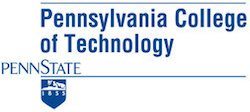
The Pennsylvania College of Technology is a Pennsylvania State University affiliate located in Williamsport, Pennsylvania. It’s officially designated as an applied technology college and offers certificate, Associates, and baccalaureate degree programs in over 100 different areas of study. Its official nickname is Penn College and is often locally called Penn Tech. The college was founded in 1914 as an extension of an existing high school for the purpose of providing students with a post-secondary education. As the needs of the community adapted, it became the Williamsport Technical Institute. The school was extremely dedicated to veteran success throughout World War II and the subsequent years. In 1965 the original technical institute was succeeded by the Williamsport Area Community College. In 1989, The Pennsylvania State University entered into an affiliate agreement with the college, which is how it received its current name. Penn Tech is the common nickname of the college because it’s reminiscent of the university’s, which is Penn State.
Penn Tech is divided into six schools, which are the School of Business & Hospitality; the School of Construction & Design Technologies; the School of Health Sciences; the School of Industrial, Computing & Engineering Technologies; the School of Sciences, Humanities & Visual Communications and; the School of Transportation & Natural Resources Technologies. These six schools enroll 5,446 students, of which the vast majority are in-state and full-time students. 21% of Penn Tech students participate in some form of distance education. The benefit to participating in any one of the 9 available online degree programs is that online students pay in-state tuition regardless of residency. They also have access to online tutoring, textbook purchase, and personal interaction with faculty. Upon completion of your degree program, you can also participate in Commencement. There is an undergraduate degree in Business Management and graduate degrees in:
- Applied Health Studies
- Applied Management
- Automotive Technology Management
- Business Administration with a Management Concentration
- Dental Hygiene
- Emergency Management Technology
- Health Information Management
- Nursing
Penn College Website
Student Financial Aid Rate: 87.0%
Freshman Retention Rate: 76%
Graduation Rate: 52%
5. Olney Central College
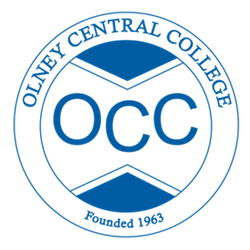
Olney Central College or OCC is a community college located in Olney, Illinois. It is part of the Illinois Eastern Community Colleges organization. It is accredited by the Higher Learning Commission of North Central Association of Colleges and Secondary Schools authorizing OCC to confer eligible students with a one-year technical certificate or two-year degree. OCC also has a partnership with Franklin University that allows them to have online Bachelors degree programs available for students. The Illinois Eastern Community Colleges organization is made up of four tax-supported schools, and this support allows OCC and other members to strive for affordability. In addition to an affordable tuition rate, 99% of all 1,198 students receive financial aid.
OCC has almost 50 different programs available for its students, for degrees, certifications, and to transfer to four-year institutions. Students are in control of their education every step of the way in order to orchestrate their ideal path into the professional world. 58% of students participate in their chosen program on a part-time basis, and only 34% take at least one course at a distance. As far as distance-learning goes, OCC is continuously expanding upon their capabilities. Students can earn three certificates entirely online with no on-campus visits, and five degrees. There are additional online degree options at the Bachelors level through Franklin College’s cooperation with Olney Central College. Students can pursue an A.S.A. transfer degree, an A.G.S. transfer degree, or an A.S. transfer degree to prepare them for enrollment at a four-year university. The Accounting and Computing and Medical Office Assistant programs are both online asynchronous degree options that will allow students to either continue their education or enter the workforce. Certificate programs that serve the specific purpose of putting students into the workforce upon completion that can be taken at a distance are Medical Transcription, or Sales.
OCC Website
Student Financial Aid Rate: 99%
Freshman Retention Rate: 66%
Graduation Rate: 54%
6. Northeast Community College – Norfolk
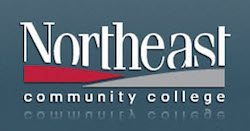
NECC is how Northeast Community College is usually abbreviated. This community college is the main campus in a four college system. The main campus is in Norfolk, Nebraska. The additional three locations are O’Neill, South Sioux City, and West Point, Nebraska. NECC was established by the merging of Northeastern Nebraska College and Northeast Nebraska Technical College in order to form a more comprehensive institution. Today, it is the only community college in the state that offers one-and two-year vocational, liberal arts, and adult education programs all under one roof. NECC offers almost 100 different degree programs at the certificate and Associates levels, all of which are covered by their institutional accreditation by the Higher Learning Commission. There are a total of 5,075 students enrolled.
The majority of the college’s 5,000+ students are part-time, and only 37% participate in the online education opportunities provided to them. Only 20 programs are currently offered online at Northeast Community College. One of them is a General Business Diploma, and there are two certificate programs in Business and Insurance Services, and Food Service and Dietary Management. There are a few partner programs that are provided in conjunction with other area schools. You can obtain an Associate of Applied Science in Business with a concentration in International Business, Insurance Services, or you can take the General approach. There are several other programs in a variety of fields that are 100% online degree programs, such as:
- Criminal Justice
- Accounting
- Agriculture
- Behavioral Science
- Business Administration
- Education
- Social Science
NECC Website
Student Financial Aid Rate: 88%
Freshman Retention Rate: 73%
Graduation Rate: 52%
7. SUNY College of Technology at Delhi
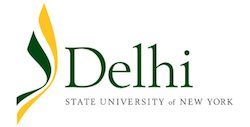
The State University of New York at Delhi is one of the technical colleges in the State University of New York System; it’s often referred to as SUNY Delhi or Delhi State College. Fittingly, this college is located in the Town of Delhi, New York. There are over 3,000 students who attend SUNY Delhi. When it was founded in 1913, it was a small farming school. In the 20’s, curriculum expanded to include general education, and then more major studies started emerging in the curriculum in the 60’s. Now, there are three main academic divisions which are:
- Applied Sciences & Technology
- Business & Hospitality
- Liberal Arts & Sciences
Through these divisions, there are more than 60 programmatic offerings that culminate in one-year certificates, two-year Associates degrees, and in select areas, four-year Bachelors degrees. SUNY Delhi was recently approved to initiate its first graduate program, which is a Master of Science in Nursing.
U.S. News & World Report ranked SUNY Delhi among the Top 50 Baccalaureate Colleges in 2010’s iteration of their annual “America’s Best Colleges” publication. The college is accredited by the Middle States Commission on Higher Education and has further accreditation from reputable agencies such as the American Culinary Federation, American Veterinary Medical Association, National League for Nursing Accreditation Commission, and more. At the undergraduate level, 74% of students are full-time, and only 22% participate in distance education; conversely, at the graduate level, 86% of students are part-time, but 100% of them are distance-learners. The online undergraduate degree programs that are currently offered fully online to students at SUNY Delhi are:
- AOS in Electric Construction and Management
- BBA in Hospitality Management
- BS in Criminal Justice
- ACEN accredited RN to BSN Program
There are two at the graduate level, a Master of Science in Nursing Administration and a Master of Science in Nursing Education.
SUNY Delhi Website
Student Financial Aid Rate: 96.0%
Freshman Retention Rate: 76%
Graduation Rate: 50%
8. North Dakota State College of Science
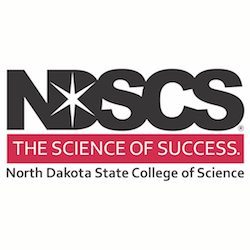
The North Dakota State College of Science was founded in 1903, and it is one of the oldest public two-year colleges in the country. The main campus is in Wahpeton, North Dakota and it is part of the North Dakota University System. The Arts and Science Division was the first to be organized in 1905 and is now the Arts, Science, and Business Division. The other academic divisions into which the school is organized are the Technologies and Services Division; the College Outreach Division and; the Extended Learning Division. There are 14 career clusters the school focuses its programs around, and there are around 115 different programs offered. These programs are at the Associates and certificate levels, and there is also an abundance of transfer degree options. North Dakota State College of Science is usually shortened to NDSCS, and it has a campus in Fargo, North Dakota.
There are 3,127 students enrolled at NDSCS, and unlike many other community colleges, it is highly residential. This is because the school strives to create a university atmosphere for its students by having several residence halls, intercollegiate and intramural athletics, music and theater groups, and 35 affiliated clubs and organizations. Even with the rich atmosphere, half of their student body are enrolled only in distance education programs, and another 17% take part in some aspect of online education through the college. The two-year degrees NDSCS offers are in the fields of:
- Business Management
- Emergency Medical Services
- English and Humanities
- Health Information
- Information and Communications Technology
- Liberal Arts
- Pharmacy
- Technical Studies
- Certificates in Pharmacy and EMS are also available to online students.
NDSCS Website
Student Financial Aid Rate: 90.0%
Freshman Retention Rate: 70%
Graduation Rate: 43%
9. Vermont Technical College

Vermont Technical College is one of five colleges that make up the Vermont State Colleges. It was founded in 1866 and operates two campuses in Randolph Center and Williston, Vermont. The main campus is Randolph Center, and it’s a rural 554-acre location. There are 1,623 students enrolled. It has received recognition multiple times from U.S. News & World Report. And College Scorecard, which is put out by the United States Department of Education, ranked the school for having the 3rd lowest student debt after graduation in Vermont, 1st in percent earnings after graduation above high school, and 5th for the highest salaries after graduation in Vermont. It’s easy to see why this small school has stuck around for nearly 200 years!
Unlike most schools on this list, Vermont Technical College offers degrees at the Associates, Bachelors, and Masters levels, including some professional certificates. There are more than 45 different programs from which students can choose. The majority of the online courses offered at VTC are through their Continuing Education & Workforce Development department. Outside of those options, there are a handful of Bachelors degree programs available for online students. These include:
- Applied Business Management
- a hybrid Manufacturing Engineering Technology
- Nursing
- Dental Hygiene
VTC Website
Student Financial Aid Rate: 87.0%
Freshman Retention Rate: 67%
Graduation Rate: 80%
10. Eastern Wyoming College
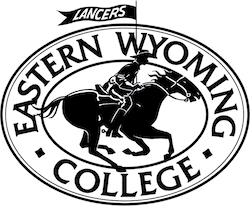
Eastern Wyoming College is headquartered in Torrington, Wyoming, and has additional locations in Platte, Niobrara, Converse, Weston, and Crook counties. Sometimes shortened to EWC, this college was founded in 1948. EWC was accredited by the North Central Association of Colleges and Schools which was absorbed by the Higher Learning Commission in 2014, so the HLC is the current accreditor of the school. In addition to that, the college is also affiliated with the American Veterinary Medical Association and the American Welding Society. Despite those affiliations, there are no additional specialized accreditations attached to any of their programs.
EWC has a total enrollment of 1,604 students. Most of the students are native to Wyoming, but there are plenty of students from other states, and even a few from foreign countries. 63% of students at EWC at part-time. The school boasts a “robust distance learning program, ” but only 24% of students are enrolled in at least one distance course. Since Eastern Wyoming College is a community college, it offers two-year degrees and certificate programs. There are 39 different Associates level degrees available, and certificates in 15 various areas. Of those 39 Associates degree programs, 4 of them are offered entirely online along with just one certificate program. These are A.A. degrees in Criminal Justice, and Elementary Education. Students have their choice of A.A. or A.S. in Interdisciplinary Studies. The Business Administration Program is for an A.A.S. The certificate program is in Child Development. The early childhood education courses are organized with the University of Wyoming and Chadron State College for credit transfers. Some of the online programs are offered asynchronously, and some synchronously, but none of them require any face-to-face instruction.
EWC Website
Student Financial Aid Rate: 92.0%
Freshman Retention Rate: 68%
Graduation Rate: 48%
11. Rend Lake College
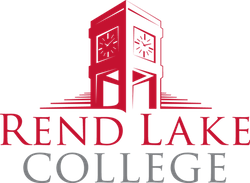
Rend Lake College is one of almost 50 schools that all make up the Illinois Community College System. Rend Lake or RLC is in Ina, Illinois and was founded in 1955. At that time, it was called Mt. Vernon Community College and was opened with the goal of providing high students with some form of post-secondary education. Even though the Junior College Act of 1965 transformed the school into Rend Lake College in 1966, Mt. Vernon Township High School and its faculty still operated as the college when classes began in 1967. The groundbreaking ceremony for construction of today’s campus was held in the Spring of 1969 on the same day that the college received accreditation from the North Central Association of Colleges and Schools. By the following fall, the first handful of buildings were ready to host students. RLC was the first community college in Illinois to complete construction of its facilities. The college now has several learning centers, a Coal Mining Training Center, and two satellites at local correctional facilities. The main campus is only 350 acres and is pretty rural. There is no student housing. 52% of the 2,489 students are part-time, and only 24% of them take advantage of online courses or programs.
There are several online classes available at Rend Lake College for students to take advantage of, creating their own hybrid programs with the course selection available in order to make the most out of their time and their education. All online students must take a course called ONE 1500 which serves as a tour of the Blackboard platform RLC uses for course delivery and helps students create strategies for success in this style of learning. The classes coincide with the traditional semesters, and students are required to complete a set amount of work each week or otherwise, they will be considered behind. RLC also gives students full access to financial aid advisors, an electronic library, and more. The only degree programs offered entirely online from RLC are an A.A. or A.A.S. in Business, along with certificate programs for Business Management and Business Management II. Courses cover a broad range of relevant topics, from accounting to marketing. RLC explains that the majority of people who complete this degree continue their education at least the Bachelors level, and may even continue up through the Masters level to complete their MBA.
RLC Website
Student Financial Aid Rate: 82.0%
Freshman Retention Rate: 65%
Graduation Rate: 56%
12. Western Wyoming Community College
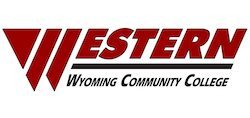
Western Wyoming Community College in Rock Springs, Wyoming is often referred to as just WWCC. It is a standard two-year college offering Associates degrees and certificates, but the school is partnered with the University of Wyoming to provide their students with the opportunity to earn a few different Bachelors degrees as well. WWCC was the fifth community college that came to be in Wyoming, and it was founded in 1959. In its inaugural year, five faculty taught evening classes to 40 students. The school has expanded in a big way since then. In 1966 a building program with a price tag of $1,822,000 began, and an additional $1,780,000 in 1973, and yet again in 1981, another building project was approved that cost more than $63,000,000. Now the campus has several student commons areas, classrooms and labs, offices, Children’s Center, studios, chemistry lab, and a theatre; there are also six residence halls.
WWCC has programs in Humanities and Fine Arts, Social Science, Science and Mathematics, Business, Technology and Industry, and Health Science. In all, there are 76 different degree and certificate programs for students to choose from, whether they plan on pursuing higher education or entering right into the workforce. Online degree programs at WWCC are offered in a schedule format, but not necessarily synchronous. There are no mandatory login times, but students must complete a set amount of work every week. The programs available fully online with no on-campus visits are certificates in:
- Accounting
- Digital Design
- Emergency Management
- Website Development
Associates degree programs provided entirely online are programs in:
- Criminal Justice
- Social Science
- Social Work
- Sociology
- Office Information Systems
- Accounting
- Business Administration
- Computer Information Systems
WWCC Website
Student Financial Aid Rate: 98.0%
Freshman Retention Rate: 60%
Graduation Rate: 42%
13. West Kentucky Community and Technical College

West Kentucky Community and Technical College or WKCTC is a part of the Kentucky Community and Technical College System and is currently accredited by the Southern Association of Colleges and Schools. Programs such as Nursing, Physical Therapy, Dental Assisting, and Radiology all carry additional accreditation by organizations that cater specifically to those fields. WKCTC was only established in 2003. It is located in Paducah, Kentucky and is the result of a merger of Paducah Community College and West Kentucky Technical College. Though it is very young in comparison to similar institutions, the Aspen Institute has included it among its Top 10 Community College list three times, and twice designated it as a Finalist With Distinction because of its impressive job training and continuing education opportunities, high completion and transfer rates, and the healthy employment rate among graduates.
WKCTC has a total enrollment of 6,065 students, and most of them are part-time, but only 45% of them participate in some form of distance-learning orchestrated by the college. The variety of online degree programs available are all in fields relevant to the job market today. There are two approaches that WKCTC takes to online learning. One of these is the Learn-By-Term model in which classes are 16 weeks, or last for a semester. There is also their Learn-On-Demand option, which tests you at the beginning of the course to see what you truly need to learn and what concepts you’ve already mastered. These courses are self-paced and vary from 6 weeks to 15 weeks in length. There are 17 Associates degrees and 38 certificates available with Learn-On-Demand, and there are eight Associates degrees and seven certificates available through the Learn-By-Term format. Both options have programs in fields like Criminal Justice, Marine Technology, and more.
WKCTC Website
Student Financial Aid Rate: 95.0%
Freshman Retention Rate: 66%
Graduation Rate: 50%
14. Northeast Mississippi Community College

Northeast Mississippi Community College is based in Booneville, Mississippi and is generally shortened to NEMCC. It is one of fifteen community colleges in the state, and it was founded in 1948. Canadian physician and political figure Dr. William Henry Sullivan sold the land to the state and expressed that he wanted a college built there, and it wasn’t long until the Northeast Mississippi Junior College came to be. At the time it was mostly seen as an agricultural school; however, its distinction as such was short lived as it was dropped just a year later. The main campus sits on that original plot in Booneville, and there are extension centers in New Albany and Corinth, Mississippi. The school finally became NEMCC in 1987. Today, the student body is comprised of almost 4,000 students pursuing any one of the 83 available programs.
NEMCC serves five counties, providing the community with career, technical, and transfer courses that are delivered flexibly during the day, night, and weekend. NEMCC has several programmatic accreditations and is wholly accredited by the Southern Association of Colleges and Schools to award students with Associates degrees and professional certificates. Mississippi State University and the University of Mississippi offer upper-division courses at all three of the NEMCC campuses. 79% of the attending students are full-time, and almost 70% of them are taking at least one course by distance. The school participates in the Mississippi Virtual Community College, which is an active partnership with other community colleges throughout Mississippi and the State Board for Community and Junior Colleges. Because of this, students can access a broader selection of courses in addition to the already generous 20 programs offered solely by NEMCC that are available for completion 100% online.
NEMCC Website
Student Financial Aid Rate: 99.0%
Freshman Retention Rate: 52%
Graduation Rate: 39%
15. Lake Region State College

Lake Region State College is located in Devils Lake, North Dakota. It was originally known as Devils Lake Junior College and Business School. The name evolved over time as the college evolved, it even spent a little over a decade as part of the North Dakota University System as a branch campus of the University of North Dakota in Grand Forks. LRSC became what it is today in the year 1999. It received its initial accreditation from the Higher Learning Commission in 1973 and has maintained it since then. The college is also a member of the American Association of Community Colleges. There are 1,947 students at Lake Region State College, each participating in one of the 16 Associates degree programs or 10 certificate programs available.
LRSC Online Campus is part of the North Dakota University System Online, and it holds the same accreditation as the physical campus does. The online campus has 6 fully online and self-paced programs that it provides students with at the moment. As the college continues to grow, more online programs will become available. Associate degrees online can be earned in the fields of:
- Early Childhood Education
- Accounting & Business Administration
- Liberal Arts
- Fitness Training
- Law Enforcement
- Speech Language Pathology
LRSC Website
Student Financial Aid Rate: 87.0%
Freshman Retention Rate: 64%
Graduation Rate: 49%
16. Patrick Henry Community College
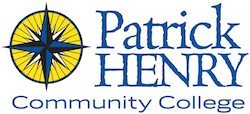
Patrick Henry Community College is a community college in Henry County or Martinsville, Virginia. PHCC was originally part of the University of Virginia’s School of General Studies at its inception in 1962. It became an independent institution just two years after that. At that time, it was operating out of a building that used to belong to Northside Elementary School. It didn’t have any of its own buildings until 1969 when the first building of the main campus was completed. PHCC has one of the most diverse student bodies among all other community colleges or similar institutions. Their 2,900 students range from 15 to 95, and hail from several different states and 11 different countries. There are over 100 different scholarships offered through the PHCC Foundation.
PHCC is accredited by the Southern Association of Colleges and Schools Commission on Colleges allowing them to award Associates degrees and other two-year certifications. Some of their programs are non-traditional, such as allowing students to earn industry-recognized certifications and hosting developmental and transitional programs. The distance-learning programs provided by PHCC enable students to take just a class or two, all the way up to their entire degree online. The college also offers Shared Services Distance Learning (SSDL) classes through the Northern Virginia Community College’s Extended Learning Institute. Students register and pay at Patrick Henry Community College, but will have access to unique online courses because of the school’s SSDL participation.
PHCC Website
Student Financial Aid Rate: 81.0%
Freshman Retention Rate: 60%
Graduation Rate: 40%
17. Northern Maine Community College
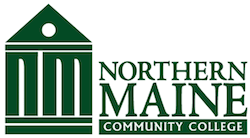
Northern Maine Community College was founded in 1961 where the Presque Isle Air Force Base used to be, and it began taking students in 1963. The campus, in Presque Isle, Maine is only 87 acres. There are 880 students currently enrolled across 37 different programs of study that will lead to either a degree or certificate. NMCC, as the school is abbreviated, boasts that 90% of their graduates are employed and doing a job relevant to their degree or are continuing their education. The college also offers a training option that employers can become involved with, so their employees would all be trained through the school. It hosts this program as part of their commitment to strengthening the economy in the surrounding community and beyond.
NMCC is one of seven member institutions of the Maine Community College System, as well as the American Association of Community Colleges, the American Council on Education and the Maine Higher Education Council. It is accredited by New England Association of Schools and Colleges, Inc. through its Commission on Institutions of Higher Education, and it also has specialized programmatic accreditation in both business technology and nursing. The college is divided into four main departments, the Arts & Sciences Department, the Business Technology Department, the Nursing & Allied Health Department, and the Trade & Technical Occupations department. The college offers a variety of online courses and programs to its students through these departments, all of which are fully online and asynchronous.
NMCC Website
Student Financial Aid Rate: 95.0%
Freshman Retention Rate: 69%
Graduation Rate: 36%
18. Renton Technical College

Renton Technical College is a two-year institution located in Renton, Washington, which is part of the Seattle Metro area. It was created as a war production school in 1942 and became a state-funded vocational school after the war ended. It continued to spread out over the years as new construction, remodels, and expansions took place. In 1991, Renton Technical College or Renton Tech became a technical college rather than vocational school. The State Board for Community and Technical Colleges took over governance and allowed Renton Tech to begin granting Associates degrees and certificates. Renton Tech is accredited by the Northwest Commission on Colleges and Universities.
Renton Technical College offers a large selection of programs in an effort to provide their community with valuable skills and viable credentials as they seek work. There are 52 career training programs with 90 different certificate options and 27 Apprenticeships. The college has 37 Associates degree options it offers on its own, 16 Associates transfer degree options, 3 Direct Transfer Agreements, and even one Bachelors degree. There are two Associates degree programs online, one in legal assisting and the other is a transfer degree in early childhood education. You can also get certified as a Nursing Assistant or Office Assistant online.
Renton Tech Website
Student Financial Aid Rate: 67.0%
Freshman Retention Rate: 73%
Graduation Rate: 38%
19. Central Community College
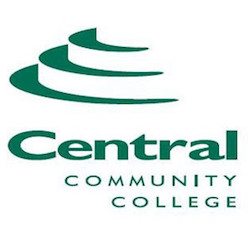
Central Community College is a community college or two-year college, that has three campuses in Nebraska. They’re located in Columbus, Grand Island, and Hastings. Central Community College, or CCC, also have three learning centers in Lexington, Kearney, and Holdrege. CCC was founded in 1966 as Central Nebraska Technical College and established its first campus in Hastings using some of the former buildings belonging to the Naval Ammunition Depot. CCC at Columbus opened in 1969 as Platte Junior College, followed shortly by CCC Grand Island in 1976. The college it is today’s administration formed in 1974. Central Nebraska Technical College was the first multi-county vocational school in Nebraska, and Platte Junior College was the first county-supported one. Now that they’ve all merged into one entity, they serve 6,316 students. CCC is fully accredited by the Higher Learning Commission and has been since the 80’s. The nursing and occupational therapy programs are also specially accredited.
Currently, Central Community College offers online Associate of Applied Science degree programs in:
- Business Administration
- Business Technology
- Health Information Technology
- Information Technology & Systems
- Quality Technology
All of these degrees can be used to enter the professional world, or simply as the foundation of your educational career. There are another 17 certificate programs that are also available online. The courses that comprise these programs are offered entirely on the web and require no on-campus time at all. The courses follow the same schedule alongside the traditional programs, but they’re still delivered asynchronously so that your classes and coursework are available any time of day.
CCC Website
Student Financial Aid Rate: 88.0%
Freshman Retention Rate: 69%
Graduation Rate: 52%
20. Nebraska College of Technical Agriculture
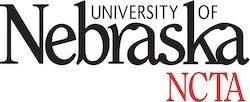
Nebraska College of Technical Agriculture is part of the University of Nebraska System. It is located in Curtis, Nebraska is a land-grant community college and was founded in 1965 although it has roots all the way back in 1913. The school that would go on to become NCTA was a high school called the Nebraska School of Agriculture. In 1946, the high school changed its name to the University of Nebraska School of Agriculture. When a former superintendent became a Senator in the Nebraska Legislature in 1965, there was quickly a bill created to transform the school into something like a junior college. It happened immediately because the bill passed with ease. The name became the University of Nebraska School of Technical Agriculture, and its first 31 students enrolled that fall. It grew over time and became the University of Nebraska – Nebraska College of Technical Agriculture in 1994.
NCTA is very decorated for a community college. The college’s Veterinary Technology Systems program was among the first to be accredited by the American Veterinary Medical Association. This program has also ranked among the Top Ten Colleges for Large Animal Veterinary Technicians by VetTechColleges.Com. At a national level, Aspen Institute, WalletHub.Com, and Community College Weekly has recognized the college for its quality, affordability, and programs offered. NCTA offers a variety of uniquely specialized courses online as well as some general courses. Due to NTCA’s special partnership with the University of Nebraska-Lincoln College of Agriculture Sciences and Natural Resources, students are also uniquely eligible for transfer opportunities.
NCTA Website
Student Financial Aid Rate: 86.0%
Freshman Retention Rate: 54%
Graduation Rate: 50%
